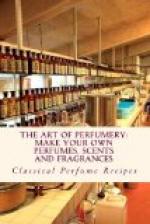[Illustration: Jasmine.]
The extract of jasmine enters into the composition of a great many of the most approved handkerchief perfumes sold by the English and French perfumers. Extract of jasmine is sold for the handkerchief often pure, but is one of those scents which, though very gratifying at first, becomes what people call “sickly” after exposure to the oxidizing influence of the air, but if judiciously mixed with other perfumes of an opposite character is sure to please the most fastidious customer.
JONQUIL.—The scent of the jonquil is very beautiful; for perfumery purposes it is however but little cultivated in comparison with jasmine and tubereuse. It is prepared exactly as jasmine. The Parisian perfumers sell a mixture which they call “extract of jonquil.” The plant, however, only plays the part of a godfather to the offspring, giving it its name. The so-called jonquil is made thus:—
Spirituous extract of jasmine pomade, 1 pint. " " tubereuse " 1 " " " fleur d’orange, 1/2 " Extract of vanilla, 2 fluid ounces.
LAUREL.—By distillation from the berries of the Laurus nobilis, and from the leaves of the Laurus cerasus, an oil and perfumed water are procurable of a very beautiful and fragrant character. Commercially, however, it is disregarded, as from the similarity of odor to the oil distilled from the bitter almond, it is rarely, if ever, used by the perfumer, the latter being more economical.
LAVENDER.—The climate of England appears to be better adapted for the perfect development of this fine old favorite perfume than any other on the globe. “The ancients,” says Burnett, “employed the flowers and the leaves to aromatize their baths, and to give a sweet scent to water in which they washed; hence the generic name of the plant, Lavandula.”
Lavender is grown to an enormous extent at Mitcham, in Surrey, which is the seat of its production, in a commercial point of view. Very large quantities are also grown in France, but the fine odor of the British produce realizes in the market four times the price of that of Continental growth. Burnett says that the oil of Lavandula spica is more pleasant than that derived from the other species, but this statement must not mislead the purchaser to buy the French spike lavender, as it is not worth a tenth of that derived from the Lavandulae verae. Half-a-hundred weight of good lavender flowers yield, by distillation, from 14 to 16 oz. of essential oil.
All the inferior descriptions of oil of lavender are used for perfuming soaps and greases; but the best, that obtained from the Mitcham lavender, is entirely used in the manufacture of what is called lavender water, but which, more properly, should be called essence or extract of lavender, to be in keeping with the nomenclature of other essences prepared with spirit.




